Our City. Our Campus.
Get directions and explore our neighborhood.
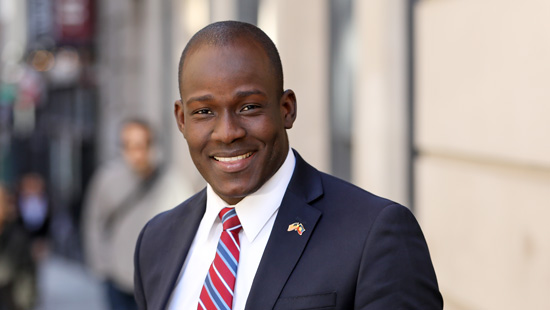
Suffolk students don’t sit on the sidelines and wait for other people to solve the world’s problems. Whether they’re directly involved in running their communities, serving in state legislatures, or making their mark in Washington, DC, current Suffolk students and alumni work at all levels of government to make a difference every day.
Our professors offer political insight from their own experience on campaigns and in administration. Plus, our Political Research Center is always at the forefront of timely and accurate polling for the most important races. Students take advantage of career-making opportunities like our summer Campaign Lab program, Washington Seminar, and internships at the Massachusetts State House (which is just steps from campus!). Our graduates leave with a practical campaign tool kit, ready to jump into the political fray.
If you want to be part of the solution, your race starts at Suffolk.
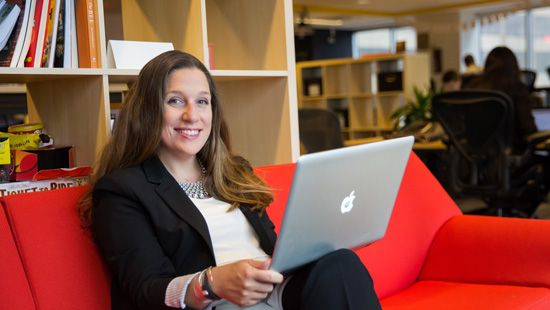
Use your artistic skills in ways you’ve never even imagined. The image of anonymous artists in white smocks working alone in attics might be romantic, but it’s not our reality.
Our students work with scientists, builders, and businesses to make innovative contributions to the world around us. Our alumni are entrepreneurs. And they’re doing it all while remaining true to their creative vision.
Through interdisciplinary curricula, art and design students work with students in other majors across campus to find solutions to multifaceted issues. Transportation infrastructure, product design and marketing, environmental pollution—Suffolk students work on all these and more. Our artists also partner with physics students in the mixed reality center to create virtual models of 3D objects—from interior design elements and layouts to models of complex scientific concepts.
Want to design the career of your dreams? At Suffolk, you can.

Shape the conversation. Shine light on injustice. Help the public make informed decisions about the issues of the day. If you want to become a trusted broadcast journalist, Suffolk is where your story begins.
You’ll learn to craft a story from professors with industry experience--including some who still report on the air regularly. Courses in news writing, production, and editing will prepare you for the hands-on reporting you’ll do throughout your time at Suffolk. Outside the classroom, you’ll build your resume and your newsreel by taking advantage of the countless internship opportunities available in our national top ten news market.
In our fully-equipped television studio, students produce original news programming and help shoot interviews with visiting politicians and celebrities through our network partnerships. Some undergraduates even get a chance to report weekly on regional news station and NBC partner NECN through our unique “Suffolk in the City” program. Want to start your own show? We can make that happen, too.
Our alumni break some of the biggest stories across the country one report at a time. You can, too.
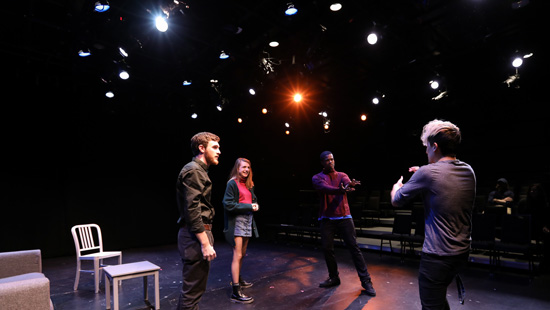
Perception is reality. At Suffolk, you can unleash your creativity to craft new worlds--virtually, artistically, and physically.
Whether it’s weaving a complete sensory story that draws an audience into a live theater performance, meticulously programming a digital simulation of a complex science experiment, or crafting a sustainable building from floor plans to bricks and mortar, you’ll draw on your artistic and technical skills to create unique, immersive experiences. Professors with skill and vision will help guide you, encouraging you to experiment and innovate. You’ll use tools as timeless as fabric and paint, and as cutting-edge as holograms and mixed reality software.
Where will your imagination take you? If you start at Suffolk, the answer is: virtually anywhere.
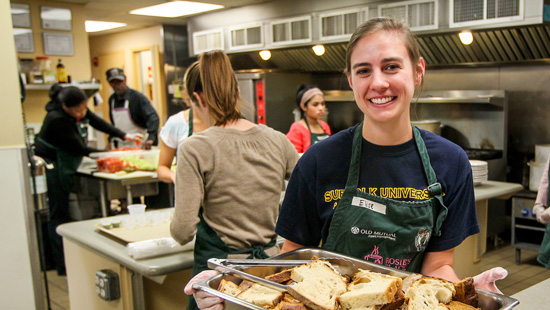
Suffolk students don’t dwell in ivory towers. They live and learn in the city of Boston. That means interacting with some of our most vulnerable populations: residents who are dealing with homelessness and housing insecurity. Rather than turning a blind eye, our students turn their attention and talents to helping those in need.
Our students address some of the underlying causes of homelessness by increasing access to quality mental health care, fighting housing discrimination, and helping to reform the criminal justice system by applying restorative justice methods that help both offenders and their communities. Through service learning, you can volunteer in shelters, nonprofits, and homeless-run businesses to directly affect the lives of at-risk adults and children. Don't wait for change. Prepare to take the initiative and craft legislation to address the needs of homeless individuals in Boston and beyond.
If ignoring society’s problems isn’t your style, learn to affect real change at Suffolk.
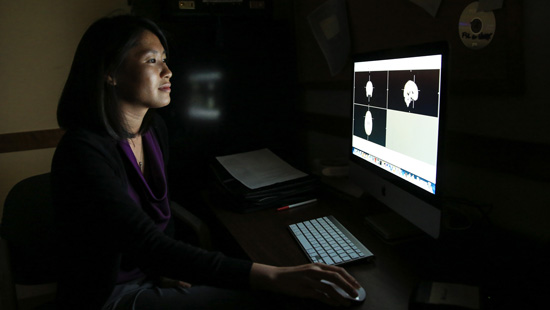
Many people--from the wildest success stories to the most hardened criminals--can trace their paths in life back to the formative experiences of their youth. You can help troubled young people find a better way forward.
Troubles, and interventions, come in many forms. Our faculty members are scholars and practitioners who do groundbreaking work in areas like restorative justice, bullying, developmental psychology, and adolescent empowerment. Many work directly with at-risk youth. Students have the opportunity to get involved through service learning, independent research, and clinical placements. After graduation, Suffolk alumni go on to work in clinical practice and research settings, nonprofit and community organizations, school and justice systems, and in policy-making and advocacy.
You can help children and young adults thrive. Learn how here.
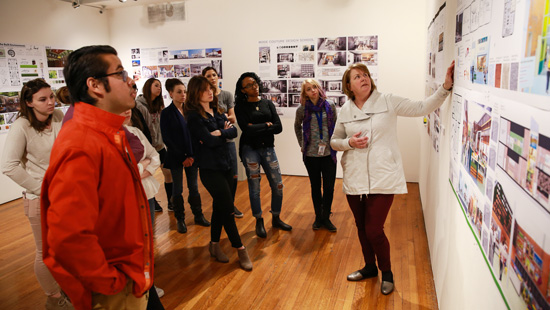
Sustainability has permeated the housing market, sparking broader discussion on affordability, architectural progressiveness, and urban development. Given the increasing shift of rural populations to urban centers, sustainable housing has become even more relevant in modern city planning.
But what is a truly sustainable home? Suffolk professors and alumni look beyond the basic checkboxes of “green” design to create spaces that benefit residents, their communities, and the environment. Our professors and alumni are experts in LEED certification—the industry standard for ecologically sound building—and teach the principles of the Well-Being Standard that considers the health and happiness of a building’s residents.
Our alumni design smart lighting that mimics the natural progression of daylight. They select renewable materials that hold up to wear and tear, reducing costs and environmental footprints. And they take clients through virtual floor plans using mixed reality technology to work out problems before any materials are wasted.
Join us and be at the forefront of sustainable design.
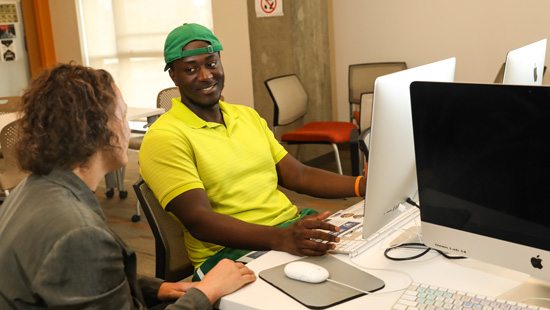
Everyone has a story to tell. At Suffolk, you'll learn to communicate well so you can share yours—and others'. Here, you'll write, create, and explore—and distill your own unique personality into a style that's quintessentially and distinctly your own.
At Suffolk, communication skills are baked into the curriculum for all undergraduates. You'll choose courses like our interdisciplinary Seminar for Freshmen based on your own interests—because it's easier to write a standout paper when you're passionate about the subject. Our faculty will help you hone those skills throughout your undergraduate career. And our Center for Learning & Academic Success can provide extra help when you need it with resources like tutoring, coaching, and more.
Most of all, our campus is rich in literary culture. From poetry readings and author talks, to our literary magazines Salamander and Venture to the award-winning Suffolk Journal student newspaper, there are so many ways to get involved and up your writing game. Or bring the words of great playwrights—or even your own—to life in our theatre productions.
Whether you want to move live audiences with your acting skills or move copies of your latest hit book, it all starts with one critical step: finding your voice at Suffolk.
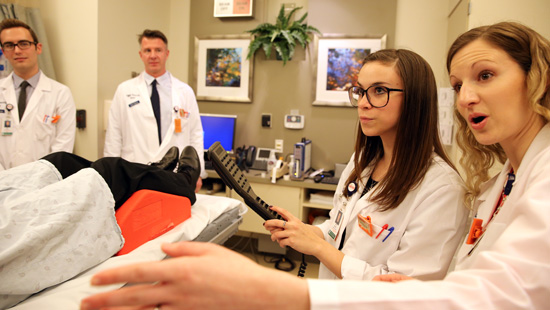
From the first use of anesthesia to the modern biotech boom, Boston has long been the world’s healthcare innovation hub. Suffolk students and alumni are adding to that legacy by advancing cancer treatment and healthcare policy.
Precise, minimally invasive treatments help target cancer while sparing a patient’s healthy cells. Our radiation therapy majors train with world-renowned experts at Massachusetts General Hospital, Dana-Farber Cancer Institute, Brigham and Women's Hospital, and other partner institutions to calculate and deliver just the right doses of cancer-killing rays. Graduate students in our brand-new Master of Science in Medical Dosimetry further hone their expertise in this complex field. And once they graduate, they're routinely hired by prestigious employers.
Throughout Boston and beyond, graduates of our health administration, healthcare MBA, and community health MPA programs make sure the nation's top hospitals and community healthcare centers run smoothly. As students, they learned from top leaders in the field. As alumni, they're streamlining care, reducing costs, increasing access to testing and clinical trials, and helping patients through every step in the cancer journey--from early detection to celebrating remission.
Study at Suffolk today so you can work toward a cancer-free tomorrow.
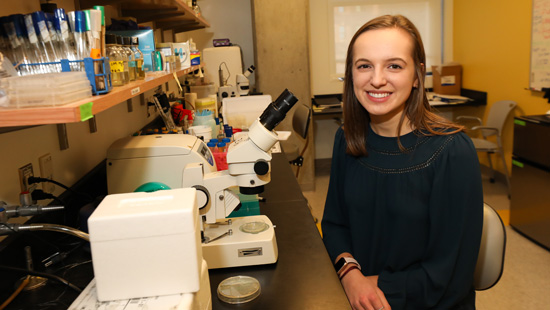
Climate change isn’t just a reality. It’s arguably the biggest problem facing the world today and into the future. Immense global challenges call for bold, new, integrated solutions. Luckily, that’s where Suffolk students shine.
Creativity and innovation are core components of our undergraduate curriculum. Professors in fields as diverse as biology, chemistry, environmental studies, government, art and design, philosophy, and business work together to offer you a holistic view of the world’s most pressing ecological problems. Understanding how complex scientific and economic factors affect climate change will help you attack the problem from multiple angles—from research and development to advocacy, policy, and green entrepreneurship.
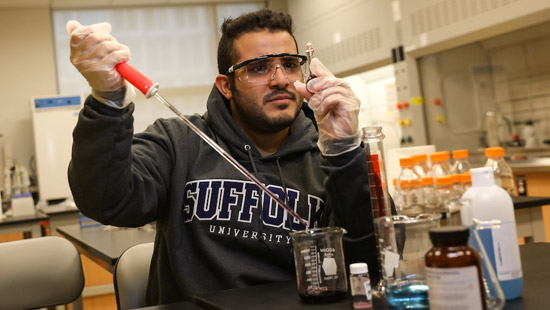
Some superheroes work in a lab. If you’re a science whiz with a passion for justice, a career in forensic science can help you fight crime with chemistry.
The field of forensics is getting more advanced—and more critical to crime detection and conviction—every day. At Suffolk, you’ll build a solid foundation in chemistry or biochemistry, and then gain specialized knowledge of genetics, toxicology, criminal psychology, and evaluating and preserving crime scene evidence. You’ll learn to ID criminals through old-school fingerprinting and high-tech DNA analysis. And you’ll intern at government crime labs or private forensic firms to put your skills to the test on real samples before you graduate.
If you want to help put criminals behind bars—and exonerate the innocent—join us in the lab.
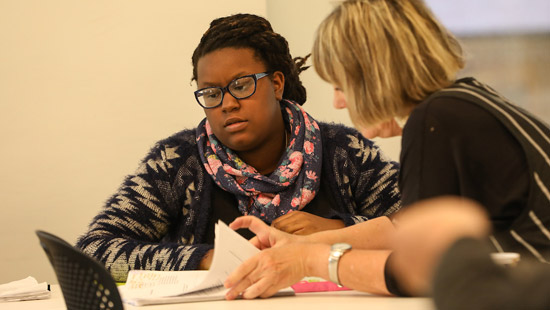
Whether your future career involves penning articles or crafting effective emails, one thing is certain: You’ll need to know how to write well. Clear, concise communication is critical for landing a job, expressing your ideas, impressing colleagues and clients, and progressing in any field. So, where do you start?
At Suffolk, communication skills are baked into the curriculum for all undergraduates. You’ll choose courses like our interdisciplinary Seminar for Freshmen based on your own interests—because it’s easier to write a standout paper when you’re passionate about the subject. Our faculty will help you hone those skills throughout your time in college. And our Center for Learning & Academic Success is there to provide extra help when you need it through resources like tutoring, coaching, and developmental English programs.
Most of all, you’ll find a supportive environment at Suffolk that’s rich in literary culture. From poetry readings and author talks, to our literary magazines Salamander and Venture and award-winning Suffolk Journal student newspaper, there are so many ways to get involved and up your writing game.
Start your next chapter at Suffolk, and you’ll be able to write your own ticket.
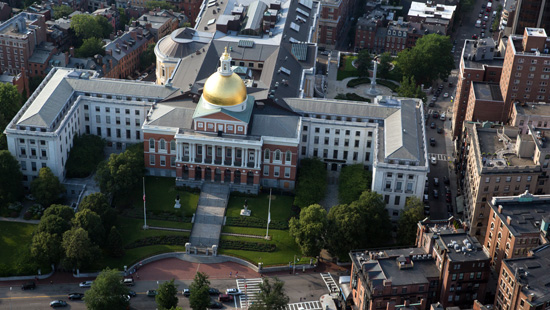
422 steps. That’s our students' average commute from Suffolk's campus to their internships at the Massachusetts State House. It’s the steps you’ll take inside the classroom, though, that will prepare you to make a difference once you arrive.
Our professors in government, crime and justice studies, applied developmental psychology, and law have years of experience in shaping domestic and foreign policy; working with communities affected by crime; and helping patients in clinical settings. These faculty members are experts in their fields and eager to share insights from their extensive research and scholarship in their classrooms. They encourage students to master the fundamentals--and to put them to the test interning for local, state, or federal government; working at consulates, nonprofits, NGOs, clinical sites, and advocacy organizations; and working in the nation’s capital through our partnership with the Washington Center.
Want to explore policymaking beyond the United States? Our travel seminars and study abroad programs will give you a global perspective on our shared challenges--and solutions.
Policy decisions that affect us all are being made every day. Want to be in the room where it happens? Suffolk can help you get there--at both the undergraduate and graduate levels.